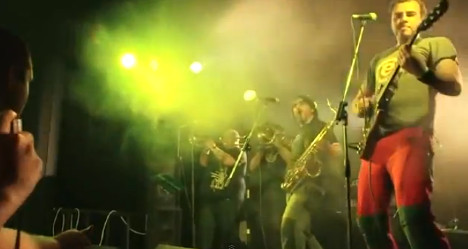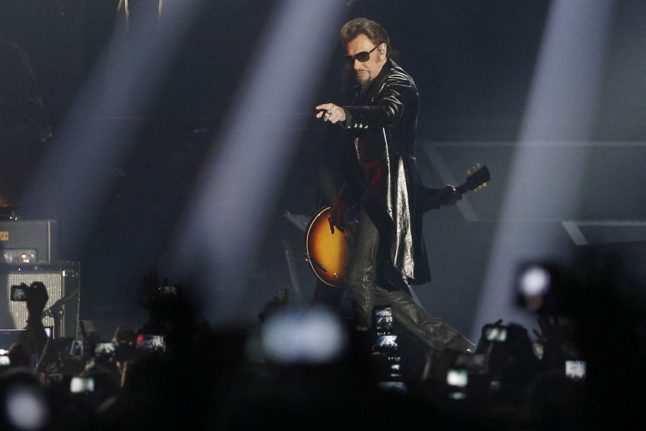This is protest music, Spanish style – and after five years of on-and-off recession, it has an enthusiastic audience here in the working class Madrid suburb of Vallecas.
Dressed in black, young fans pogo on the dance floor, slamming into each other as the band rampages through "Familia Y Real", its anthem against Spain's increasingly unpopular monarchy.
"An illegal system, imposed by the sons of fascism! The Bourbon king is robbing me from dawn to dusk!" Diego sings, breaking off to lay on a catchy Caribbean ska rhythm with his trumpet.
"It is a very direct form of music, which deals with social issues," says Diego, 32, a teacher by profession but currently unemployed, with brown hair down to his tattooed shoulders.
"Ska punk wasn't very popular in Spain until about 10 years ago. But I think slowly people are starting to appreciate the spirit of punk," he adds, smoking wearily after an hour roaring and hopping about on stage.
"A lot of our songs are about how bad the jobs situation is, and the political system that we don't believe in. We try to focus the songs on our own experiences: being unemployed, earning no money, having to pay the mortgage."
Like much alternative music in Spain, the songs by Diego's band Oferta Especial — currently planning a new album — echo the mass street protests in Spain over recent years.
Like the demonstrators, singers complain of social injustice, economic hardship and political corruption, outraged by scandals that have even touched the conservative Prime Minister Mariano Rajoy.
At the hip hop end of the spectrum, June saw the release of a new album by Mala Rodriguez, the Latin Grammy-winning princess of Spanish rap.
The first single from it, "La Rata", alludes to what she calls a "crisis of values" in the country.
"There's the prime minister, that bastard, why did we vote for him?" she moans, dropping her consonants in her sultry Andalusian accent as the rap mounts to a climax.
"I have heard a lot of musicians in Spain who are politically engaged and not afraid to express their anger," said Rodriguez, 34, known as "La Mala", or "Bad Girl".
"Rap was the only way I found to do it when I was young," she told AFP.
"Right know, in hard times when things are tight, you see who is armed for the fight."
Observers say the mainstream music industry is resisting the wave of protest, however.
"La Rata" has made no mark on a Spanish top-40 chart dominated by international stars such as Jennifer Lopez and Rihanna.
La Mala's new album is "an invective against complacent cultural attitudes towards the crisis our country is undergoing", according to the editor-in-chief of the Spanish edition of Rolling Stone magazine, Beatriz G. Aranda.
"The groups that grab the attention of the media and public have a naive and individualistic vision of the world," the editor told AFP.
"The protest song has taken on pejorative connotations in Spain and that has not helped."
Flamenco: Spain's original protest music
Known for rapping on social themes, Mala Rodriguez is proud of her roots in her native southern Andalusia – one of the parts of Spain hardest hit by the recession.
She says her style of rap is influenced by flamenco, the traditional gypsy lament native to her home region and itself an age-old form of social protest.
"Flamenco, like rock, is a music form created by those excluded and marginalized in a capitalist society," explained Aranda. "Flamenco has been politically engaged since the beginning."
Another Andalusian musician with flamenco roots, Chico Ocana, says he plans to release a new album of protest songs later this year.
Since the early 1990s he has fused flamenco vocals with blues and rock 'n' roll, singing poignant satirical ballads in a gravelly voice with soaring choruses.
His new album will mix in funk, rock and Latin styles, with lyrics about corruption scandals and the evictions of ruined homeowners that have sparked outrage in Spain.
"The songs are about protest, the crisis, the cuts, the war of the rich against the poor," says, Ocana, 56, recalling his own deprived upbringing in the south.
"I've been a child of crisis since I was born," he says. "When nothing is being done, you have to make something happen. That is why I sing."



 Please whitelist us to continue reading.
Please whitelist us to continue reading.
Member comments